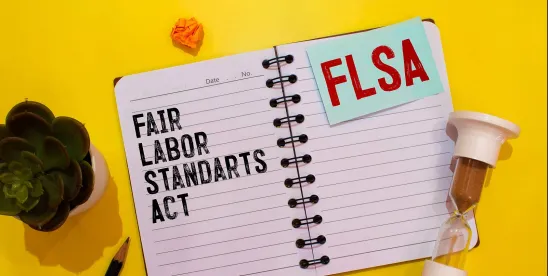Are home health and personal care workers eligible for overtime? That is a more complicated question than it first appears. In fact, it could be about to change again as certain providers of home health and personal care workers face a major shift as the U.S. Department of Labor’s (DOL) Wage and Hour Division (WHD) moves to restore certain long‑standing exemptions under the Fair Labor Standards Act (FLSA). As a result, providers of home health and personal care workers should prepare for the impact of this significant policy reversal on employees and the company.
History of Statutory Exemptions Under the FLSA and Chevron Deference
In 1974, Congress amended the FLSA to extend coverage to all domestic service workers, simultaneously carving out two key exceptions:
- A complete exemption from minimum wage and overtime for “any employee employed in domestic service employment to provide companionship services for individuals who (because of age or infirmity) are unable to care for themselves” (the Companionship Exemption); and
- An exemption from the FLSA’s overtime requirements for “any employee who is employed in domestic service in a household and who resides in such household” (the Live‑In Exemption).
The result was that workers who fell into the Companionship Exemption could be paid less than minimum wage, and workers in either exemption were not eligible for overtime. Congress authorized and instructed the DOL to define the terms “companionship services” and “domestic service employment,” leading to the DOL’s 1975 regulations. Under the 1975 regulations, third‑party employers (such as home care or staffing agencies) were eligible to claim both the Companionship and Live‑In Exemptions.
Almost 40 years later, in 2013, the DOL published a final rule that revised and dramatically narrowed the Companionship and Live‑In Exemptions (the 2013 Rule). Among other things, the 2013 Rule:
- Precluded third‑party employers from claiming either the Companionship or Live‑In Exemptions; and
- Narrowed the definition of “companionship services,” capping “care” duties at 20% of total hours worked for exempt employees.
The 2013 Rule forced most home health and personal care providers to begin paying minimum wage and overtime for workers who were previously exempt. Not surprisingly, there was some litigation filed but the DOL prevailed and, in 2015, started enforcing the 2013 Rule. Imperatively, in upholding the 2013 Rule, the courts granted deference to the DOL’s interpretation under the analytical framework set forth in Chevron, U.S.A., Inc. v. Natural Resources Defense Council, Inc. (As you may recall, in 2024, the Supreme Court overruled the long-standing Chevron doctrine via its Loper Bright opinion.)
The drastic shift in the DOL’s regulations caught numerous home health and personal care provider companies off guard, prompting a wave of investigations and fines that resulted in unprepared employers paying millions of dollars in backpay. The overtime requirements of the 2013 Rule also created reimbursement gaps for companies that serviced families on government-funded health insurance.
July 2025 Developments
On July 2, 2025, the DOL issued a proposed rule that would restore the pre‑2013 Companionship and Live‑In Exemption frameworks. The proposed rule relies on Loper Bright and seeks comments as to whether its pre-2013 interpretation with respect to third-party employers is a “better reading of the FLSA’s statutory text.” Public comments are due to the DOL by September 2, 2025.
On July 25, 2025, the WHD published Field Assistance Bulletin (FAB) No. 2025‑4, announcing that it will “immediately discontinue enforcement” of the 2013 Rule, “including open cases.” Among other things, FAB No. 2025‑4 also instructed that WHD investigators cannot investigate or take any enforcement actions against third‑party employers, including home care agencies, that rely on the Companionship or Live‑In Exemptions.
How Can Home Care Provider Employers Prepare?
In light of FAB No. 2025‑4 and the pending final rule, home care agencies have a critical window to prepare for the restored Companionship and Live‑In Exemptions:
- Review current classifications and pay practices for all employees and identify who might be exempt under the new rule.
- Track the DOL’s notice-and-comment process, as a final rule may shift the landscape again.
- Stay informed on state-level wage and hour laws that may differ from federal exemptions.





 />i
/>i

